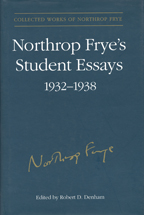I want to communicate to readers of the Frye blog a few ideas that are emerging from my reading of Robert Denham’s splendid edition of the undergraduate essays. My reading is in its early stages, and I have plunged in where I have least business-into the theological and mythic essays. In reading them, I was reminded how far Frye’s religious and social ideas were driven by events, real or imaginary, rather than doctrines or propositions. The Incarnation, the imagined circumstances of what he at that time called ‘the savage’ as he waited to see what happened after the earth went dark, the Wall Street crash—these were the things that got Frye going, not the desire to refute I. A. Richards’s view of emotion as the basis of poetic language or the impulse to contribute to the literature.
In these essays, Frye is already eager to praise “the refusal of a free mind to be bullied by the interpreters of tradition” (266). There is already a slight revulsion from a Church “settled, respectable and already a bit smug” and a willingness to position James and Paul at “opposed ends of a curve” (159) to make them Yeatsian mask and anti-mask if you like. Once we say this, of course, it becomes clear that young Frye is already a strong reader, bending the heavy machinery of the big books that appear in his reading lists—very big books, I’m checking some of them out of the library—into the kind of tools he can use himself.
With this, I also sense some of the ambivalence that makes position in twentieth-century thought so difficult to assess. Even if we take this in parochial, Eng. Lit. terms, we have the Frye who can emerge from the smoke, fire, and grease of the literature of sacrifice with the confident comment that “The fundamental experience is the problem of the good life: how best self-development may be integrated into the social relationship…. the separate and sometimes conflicting claims of the individual and group.” Here is a Frye who the recently-deceased Jacques Barzun and Lionel Trilling could have welcomed onto the Great Books course, had Columbia been able to recruit him. But then we have the Frye who sees “the horror of isolation for the savage, the absolute and irrevocable doom of anyone cut off from the protection of the tribe” (112) as the beginnings of science, mythology—of ultimately his own myths of speculation and concern, to stretch a point, a Frye Jean O’Grady was eager to question Michael Dolzani about at our recent centenary confidence. This is a Frye who did not take the Schools Inspector track to English studies, but the other quotation shows that Frye was no self-congratulating advocate for the “hermeneutic of suspicion.” The myths or, if you like, the experiences of cooperation and anxiety appear to shape Frye’s intellectual history throughout his career and they shape the way he frames his critical inquiries. In this volume, I noted that Frye observes “The moment that man becomes critically [my emphasis] aware of the world, he is aware of the world, he is aware of a rhythmic recurrence of heavenly bodies, an organic living world independent of the will, which augurs a larger concept of forces than he himself has” (116). This is a long way from the shibboleths of “critical thinking” some of my well-intentioned colleagues foist on their students. Yet it seems to come as naturally as the leaves on the trees as a source for Frye’s speculations—you never feel he is straining himself into sublimity in the way you do with Bloom, feasting on fears and irrationalities as with De Man.
This is early days in my reading of this volume. But I thought it useful to offer it to the blog in the hope that it might be worth reading.

